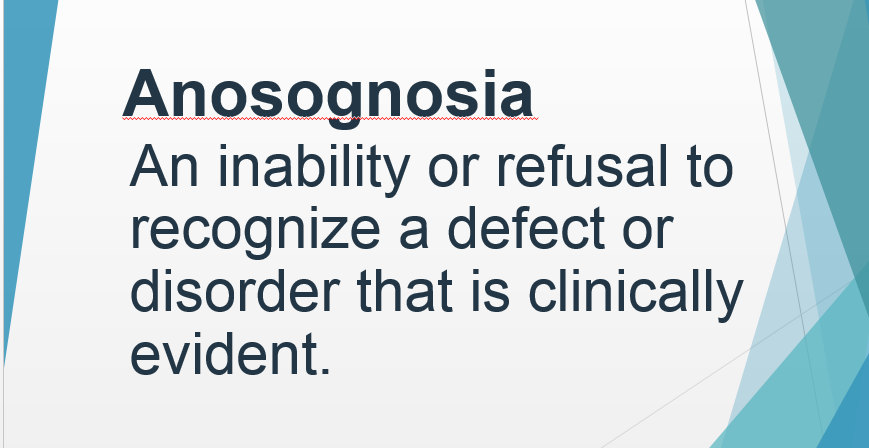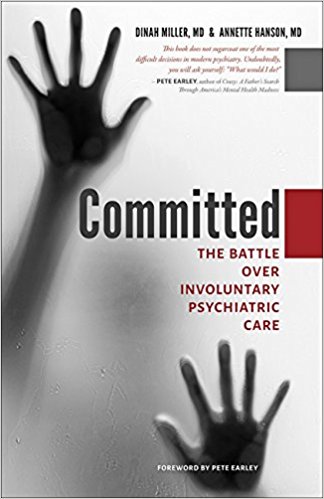
(3-12-18) Dr. Dinah Miller, the co-author of COMMITTED: The Battle Over Involuntary Psychiatric Care, which was just released in paperback, has taken on the subject of anosognosia and mental disorders. I thought you would find her take of interest.
The Perplexing Semantics of Anosognosia
Why an obvious phenomena has sparked controversy.
Columbia psychologist Xavier Amador has noted that this inability to appreciate that psychiatric symptoms are the result of an illness bears striking similarities to the anosognosia seen with stroke victims. He has used the same term to describe this lack of awareness of illness in psychotic disorders such as bipolar disorder and schizophrenia, with the same meaning: the underlying lack of awareness that there is an illness process is the result of a pathological, neurally mediated process, and not the result of the psychological defense mechanism of denial.
Is anosognosia after stroke the same as anosognosia during psychosis? Since we don’t have the precise biological mechanism for either, it’s hard to say, and I might contend that it really doesn’t matter. In my search for an answer to this, I called the office of the now late Dr. Oliver Saks, as he had described anosognosia in his his popular case studies. I was told that he didn’t like to comment on this. I tried Dr. Solomon Snyder at Johns Hopkins, a renowned neuroscientist. Dr. Snyder told me, “In my personal experience, a substantial number of psychiatric patients lack appreciation that they are disturbed and so merit the anosognosia designation. In that sense, they are similar to neurologic anosognomics. It would be tempting to speculate that similar brain dynamics underlie the problem in psychiatric as in neurologic victims. However, we know nothing of the fundamental neural dysfunction for either group of patients, so it all remains in the realm of conjecture.”
Clinically, what happens to these patients when their psychosis clears? From my personal observations, several outcomes are seen. Some people come to realize they were ill during the psychotic episode and their insight is restored. Sometimes this is tinged with a little bit of doubt that perhaps those strange things may really have been happening. Other times, people simply don’t recall all the events that occurred during one the episodes. There may have been illicit drugs involved, or there may have been prolonged periods without sleep and a frantic quality to the whole episode. Some people will try to explain their behavior in terms that make it seem understandable and normal, while dismissing the idea that they ever did anything as bizarre or troublesome as others may imply. So this lack of awareness that the patient has been ill may come and go over time.
Since we all agree that people with psychotic disorders may not be aware that they are ill, why is this an area of controversy? Whether we say on the mental status exam that the patient lacks insight or we call it anosognosia, it all comes down to a matter of semantics. Somehow, however, the word anosognosia has become politically loaded: when someone uses it, by extension, it has come to mean that they are in favor of legislation to make it easier to treat patients against their will.
Whoa! How did we get from the idea that if people are not aware that they are ill, that we can give this a special word and then force patients to have treatment they may not want? The term anosognosia, as mentioned above, implies that there is a neural basis for this impairment, that it’s like when a patient has Alzheimer’s disease, or a stroke, or any other neurologically disabling disorder, and we treat their biological illness, with someone making substituted decisions for them. Instead of being a civil rights issue, it becomes a medical treatment issue.
Is there something wrong with this? Well, not always. As a field, psychiatrists are in agreement that it’s sometimes necessary to force medications on someone who is acutely dangerous as a result of their illness. But psychosis is a tormenting state, and some people (not all) with anosognosia will still comply with treatment and take medications, even when they are not aware that they are ill. It takes effort and engagement on the part of the treatment team, and I worry that if we ascribe to the idea that patients with anosognosia won’t take medications, then we rush to involuntarily treat them. After all, why go through the work of trying to engage someone when you can simply force them to get treatment? And just to be clear, this process is not always pretty; when a patient refuses care, they may be brought into the hospital in handcuffs by police, then later held down by security guards while they are injected with medications they don’t want. It’s certainly a situation to be avoided. From the psychiatrist’s perspective, it makes us the adversaries of the people we are serving, and it makes for very long days.
Are there people who simply can’t be enticed to accept treatment, who lack insight that they are ill, but who suffer miserably and represent a danger to themselves or others? Yes, and sometimes there really is no choice.
Not all patients like this concept of anosognosia: some feel that if they disagree with their diagnosis or object to the treatment plan, that their opinions are discounted as being the result of anosognosia. In fact, psychiatric diagnoses may be imprecise, they may change over time, and there may be mitigating factors.
Finally, let me point out one other issue with using anosognosia as the standard for involuntary treatment. Psychiatrists are comfortable with a standard of dangerousness for involuntary treatment, and this includes people who are acutely suicidal. Unlike those with psychosis, people who are suicidal as a result of being depressed are often well aware that something is wrong with them. If we change the standard for involuntary treatment to apply to those with anosognosia, where does that leave us when a depressed person is seen in the ER and there is notable fear that he might kill himself? Do we say that his insight is intact, that he knows he’s depressed, and he’s making his own decision, and let him leave?
I don’t know what the exact right answer is here, but I do know that it’s very hard to let a suicidal person walk away.
First published in Psychology Today. Used with the author’s permission.





There’s no controversy here. People with psychotic disorders sometimes don’t know they are suffering from a mental illness, and there really is nothing to argue about. And yet, the word “anosognosia”—meaning the patient is unable to see that he is ill—is a charged word.
Why is that? Let me talk a little about the history of this word and the political meaning it has taken on.
Anosognosia is a term that was coined in 1914 by a Hungarian neurologist named Joseph Babinsky. Babinsky noticed that sometimes after a stroke, people are unaware of their deficits. This is presumed to be a result of pathophysiologic changes in the brain, and not the psychological defense mechanism of denial. There is not a precise anatomical finding that predicts anosognosia: you can’t look a patient with anosognosia and say, “ah, the MRI will show a lesion in X area of the brain.” Though certainly, some deficits are more likely to include anosognosia than others.